-
About
- About Listly
- Community & Support
- Howto
- Chrome Extension
- Bookmarklet
- WordPress Plugin
- Listly Premium
- Privacy
- Terms
- DMCA Copyright
- © 2010-2025 Boomy Labs

 GOAT Series Staff
GOAT Series Staff
Listly by GOAT Series Staff
What is the greatest movie one-liner of all time?
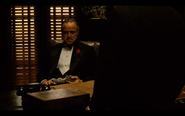
In a film series focused around an overtly violent lifestyle, it was refreshing and eloquent to see a veiled threat. Vito Corleone, the head of a massive and nearly omnipotent crime family, fulfilled his promise of getting his relative an acting role in the most sadistic and brutal way possible, and it all began with this delicately-phrased line. In spite of the many ethical codes that accompanied the Corleone family and its violence, the use of decapitations on horses was evidently not prohibited, and its appearance in the ensuing scenes retroactively empowered Vito’s line. The line was a beautiful and shocking way to demonstrate how much power came with the family title, and managed to make a point without crossing into blatant shock value. And although it may just be a coincidence, modern day Hollywood directors own far fewer racehorses.
Film: The Godfather | Release: 1972 | Director: Francis Ford Coppola | Box Office Gross: $245 to $286 million
Actor & Character: Marlon Brando as Vito Corleone | Context: Euphemistically describing Vito's plan to coerce a studio head into cooperation.
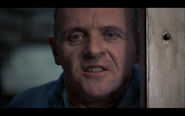
Thanks to the free advertising in Silence of the Lambs, fava beans have reentered dining rooms around the world, and Chianti is poured with a mandatory recreation of Anthony Hopkins’s infamous line. Delivered during Clarice Starling’s visit to the cell of Hannibal Lecter, this line put a chill into every member of the audience, and left an impression of Anthony Hopkins’s terrifying stare in the minds of all future viewers. Although Hopkins played a sociopathic cannibal with more skill than most actors could summon, his defining moment came with this line, where he completely sold his character and struck fear into the hearts of census takers everywhere. Something about Hannibal Lecter’s judicious reveals of courtesy and viciousness made him a figure of cinematic legend, and Anthony Hopkins’s line made him a cinematic nightmare.
Film: Silence of the Lambs | Release: 1991 | Director: Jonathan Demme | Box Office Gross: $272.7 million
Actor & Character: Anthony Hopkins as Hannibal Lecter | Context: Describing the fate of a census taker who probed too far into the cannibalistic Dr. Lecter's private life.
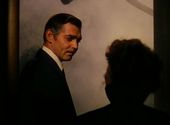
This line has nested comfortably in the top tier of film quotes since its inception, and its praise is far from undeserved. After the lengthy and absorbing experience of Gone with the Wind, in which Scarlett O’Hara and Rhett Butler tempted the audience with a satisfying romance that never truly solidified, the need for an emotionally powerful and resolving scene was greater than ever. When Rhett finally gathers the courage to push away Scarlett, whose concerns immediately fall to her own wellbeing and how she will maintain her status, he proceeded to offer his own rebuttal to her protests. The line was callous and harsh, but it felt entirely earned, considering the toying nature of their relationship and the need for clarity. Rhett’s statement was more than just a shove back against Scarlett’s pleas; it was a much-needed moment of agency and character determination.
Film: Gone with the Wind | Release: 1939 | Director: Victor Fleming | Box Office Gross: $390 million
Actor & Character: Clark Gable as Rhett Butler | Context: Dismissing the concerns of Rhett's unrequited love, Scarlett O'Hara.
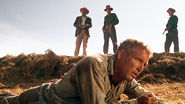
Communication may be the cornerstone of any good relationship, but this line – delivered by an oppressive chain-gang warden in Cool Hand Luke – challenges that notion. The eponymous Luke, an up-and-coming rebel within the prison system, found his perfect opponent in the order-worshipping Captain. After failing to obey orders while on a chain-gang march, Luke was subjected to a beating, and subsequently informed of the root of his disagreements with authority figures. The shaky, almost unassuming nature of the line’s delivery only heightened its absurdity, and succeeded in fostering both disdain and admiration for The Captain. As the film progressed and the contest for the prisoners’ respect grew between Luke and The Captain, one thing became abundantly clear: on a practical as well as ideological, the conflict was always about the failure to communicate.
Film: Cool Hand Luke | Release: 1967 | Director: Stuart Rosenberg | Box Office Gross: $16.2 million
Actor & Character: Strother Martin as The Captain | Context: Understating the conflict between Luke, a rebellious prisoner, and The Captain, a cruel warden in charge of a chain-gang.

There was never much dispute about Clint Eastwood’s tough-as-nails acting abilities, particularly in his desperado roles, but the character of Harry Callahan redefined what it meant to be “hardcore.” Sudden Impact was the fourth in a series of films featuring the detective, and one of the earliest scenes in the film – an attempted hold-up in a diner – highlighted Callahan’s ability to remain steady and lethal under pressure. After Callahan’s nigh-equally amusing reference to his three-man combat team (“Smith, Wesson, and I”), he dispatched a group of gunmen, leaving only one would-be thief alive. When the last gunman took a hostage, Callahan was quick to inform him of the punishment for harming an innocent bystander, and how much enjoyment he would receive from firing a revolver bullet in return. With no other options, and Callahan’s iron-hot stare burning into his eyes, the gunman released the hostage and allowed himself to be arrested by waiting officers. Clint Eastwood’s delivery was cold, calm, and even a bit sadistic – but it certainly achieved its goals.
Film: Sudden Impact | Release: 1983 | Director: Clint Eastwood | Box Office Gross: $67.6 million
Actor & Character: Clint Eastwood as Harry Callahan | Context: Daring an armed gunman to harm a hostage, thereby justifying Callahan's retribution with his characteristic revolver.

Francis Ford Coppola’s renowned novel-to-film adaptations took him from American mafia dealings to the jungles of Vietnam, and he presented all of his settings and characters with amazing depth. This adherence to artistic vision and cinematic excellence was especially true in Apocalypse Now, where the bizarre nature of war was on full display, and was deeply explored in the minds of the film’s soldiers. When Lieutenant Colonel Kilgore reached the beachheads that he had recently bombed (to the tune of a Wagner operatic melody, no less), his first observation pertained to the aroma of warfare. The Lieutenant Colonel delivered the line while wandering among the smoldering, flame-spouting ruins of the beach and its nearby village, and the satisfaction on his face only served to further define Kilgore’s twisted character.
Film: Apocalypse Now | Release: 1979 | Director: Francis Ford Coppola | Box Office Gross: $150 million
Actor & Character: Robert Duvall as Lieutenant Colonel Bill Kilgore | Context: Praising the "aroma" of a beachhead covered in burning napalm.
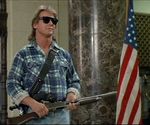
John Carpenter wasn’t exactly known for his prowess in directing drama films, but They Live was proof that memorable lines can come from any genre. Centered around an intangible takeover of the Earth by skeletal-looking aliens (which can only be spotted by the drifter Nada’s new pair of sunglasses), the plot is a satiric and over-the-top romp through 1980s America and its media fascination. When Nada, played by Roddy Piper, enters a bank with a shotgun in hand, the ridiculousness reaches a boiling point. Surrounded by stunned-looking customers and clerks alike, Nada delivers his infamous line, spots the disguised aliens in the crowd, and opens fire with a hail of shotgun pellets. The sheer insanity of the scene – including its comically evil alien makeup – undercuts the shooting’s violence, and perfectly encapsulates They Live’s fascination with the divide between reality and warped media depictions.
Film: They Live | Release: 1988 | Director: John Carpenter | Box Office Gross: $13 million
Actor & Character: Roddy Piper as Nada | Context: Entering a crowded bank to dispatch aliens, which have cleverly hidden among the human population.
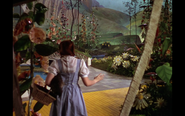
Dorothy Gale’s first experience of Oz and its strange surroundings needed no dialogue, since the world’s presentation was strong enough to enchant the viewer and set the stage for the story with ease. One of the first lines spoken by Dorothy (played by Judy Garland), however, managed to capture the innocence and charm of her character with only a few words. It was uttered with Toto close at hand, and a stare full of the mysticism and foreignness of Oz. The line was memorable because it made no particular effort to stand out in the viewer’s mind. Despite its matter-of-fact nature, it was an endearing way to introduce the scene and establish a tone for the world of Oz, as well as scoring some extra points for the use of an adorable dog.
Film: The Wizard of Oz | Release: 1939 | Director: Victor Fleming | Box Office Gross: $3 million
Actor & Character: Judy Garland as Dorothy Gale | Context: Expressing Dorothy's confusion after her transportation to the land of Oz.

It was truly the kick heard ‘round the world. With one furious proclamation to a Persian messenger and his assistants, Gerard Butler became one of the most quoted men in movie history. Part of the line’s power came from the film’s pre-release trailers, which paired the messenger’s slow-motion descent into a bottomless pit with the thumping electronic music of Nine Inch Nails, but another aspect of its memorable presentation was the lead-up to Butler’s line. An exchange with increasing tension provided the perfect backdrop for Leonidas’s explosion of anger, and Zack Snyder’s hyper-stylized vision of Spartan combat made the scene feel dreamlike but engaging. Although Gerard Butler put in the necessary work to look like a Spartan warrior, it was his dedication to the passion (and rage) of King Leonidas that sold the scene as a whole.
Film: 300 | Release: 2007 | Director: Zack Snyder | Box Office Gross: $456 million
Actor & Character: Gerard Butler as King Leonidas | Context: Sending a message to the Persian emperor, Xerxes, in the form of an executed messenger.
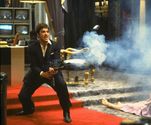
In the years prior to Scarface, Al Pacino may not have been considered the top choice for playing a Cuban-American drug lord, but it’s hard to imagine anybody else in the role nowadays. His performance as Tony Montana was memorable and thoroughly enjoyable, and part of the brilliance relied upon Pacino’s ability to sink into Montana’s lifestyle of violence and decadence in a believable manner. With a smearing of cocaine on his face and a machine gun in hand, Pacino delivered one of the greatest opening lines to a fight scene in action movie history, and initiated the battle with his “friend” – a rifle-mounted grenade launcher. The line was overcharged with Pacino’s raw anger, and the chaos and high production values of the ensuing explosion were enough to elevate the line’s quoting potential for years to come.
Film: Scarface | Release: 1983 | Director: Brian de Palma | Box Office Gross: $65.9 million
Actor & Character: Al Pacino as Tony Montana | Context: Preparing to fire a rifle-mounted grenade into a group of enemy gunmen.

For viewers of Jaws in its first theatrical run, the terror of imagining an unstoppable shark in the ocean was enough to drive swimmers out of the water for years to come. Over the years, more “intense” films have made Jaws seem less terrifying in retrospect, but many of its scenes and moments of slow-burning tension still hold up under scrutiny. One of these moments is the delivery of Roy Scheider’s ad-libbed line, which replaced a far more generic recommendation of escape. The certainty and terror in Scheider’s voice was what ultimately made the line work, and in spite of the film’s age, something about the statement continues to resonate with modern audiences. People may have been forced out of the ocean because of Jaws’s underwater scenes, but a fair amount of fishermen were probably dissuaded by this moment in particular.
Film: Jaws | Release: 1975 | Director: Steven Spielberg | Box Office Gross: $470.6 million
Actor & Character: Roy Scheider as Martin Brody | Context: Advising the fishing crew to adopt a larger vessel, considering the size of the great white shark circling them.
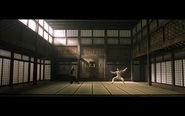
A film series like The Matrix was praised and criticized for its exploration of deep – and often heavy – thematic content. Themes such as the nature of reality, the convergence of technology and everyday life, and the disintegration of identity were all present and alive in The Matrix, but they were also joined by grin-inducing one-liners. After Neo (as played by Keanu Reeves) was given access to files with martial arts training, he woke up with a very distinct thought, which would later be explored in a fight scene with Morpheus. The line was enough to offset some of the bleak and unsettling content of the surrounding scenes, and the unexpected nature of his new skill set helped to show off exactly what an active neural uplink (and Neo) could accomplish.
Film: The Matrix | Release: 1999 | Director: The Wachowski Brothers | Box Office Gross: $463.5 million
Actor & Character: Keanu Reeves as Neo | Context: Explaining Neo's newfound martial arts abilities, which were uploaded directly into his mind.
